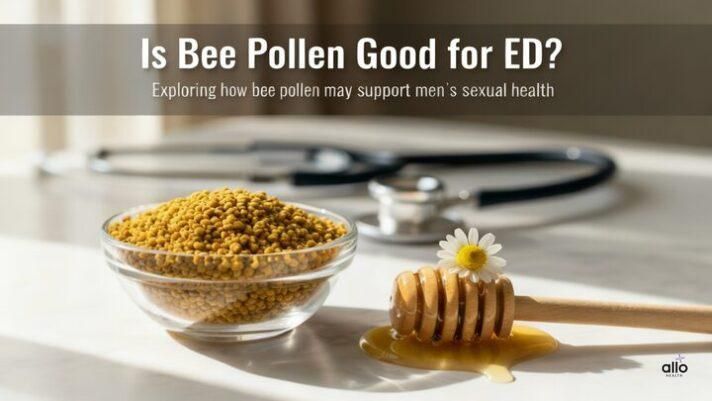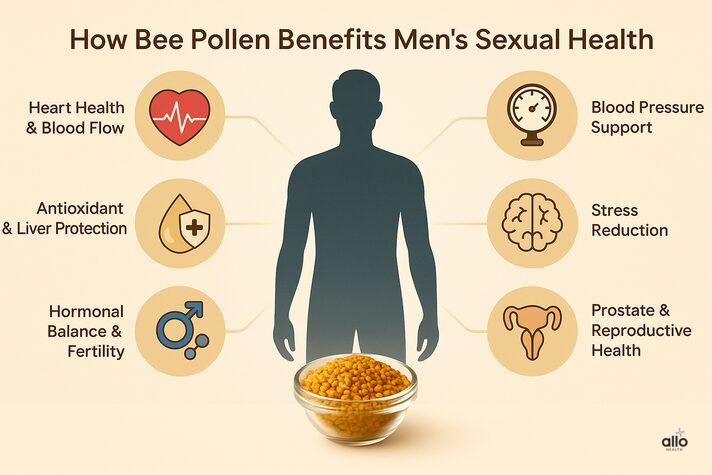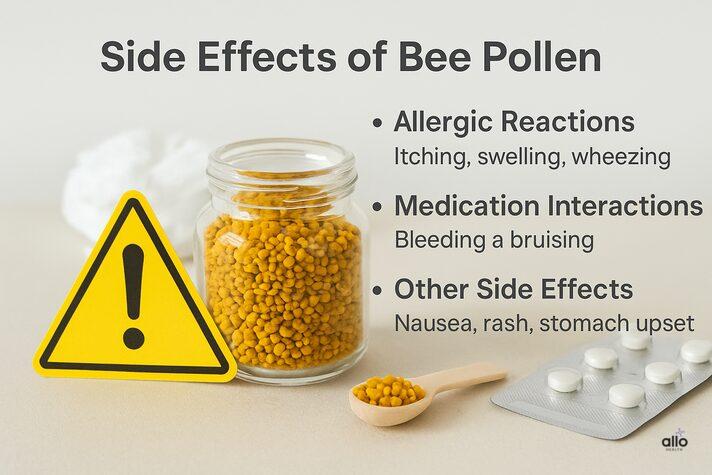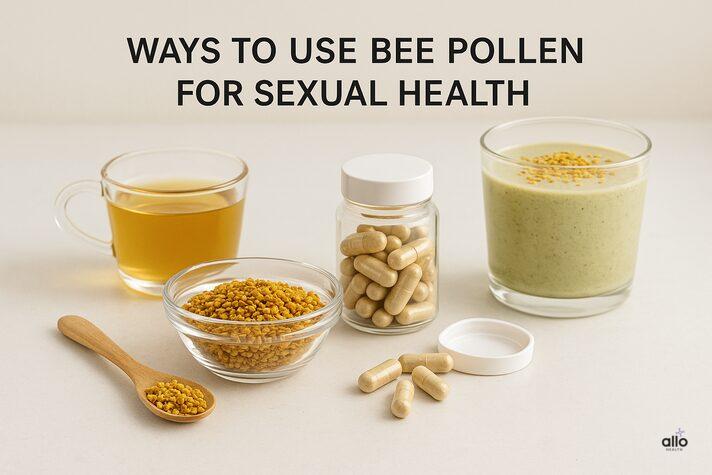Bee Pollen for Erectile Dysfunction: Benefits on Sexual Health
Written by Dr. Deepali Anand

Dr. Deepali is a medical writer and healthcare professional with a background in clinical surgery and patient care. Having transitioned from active clinical practice to medical communications, she specializes in bridging the gap between complex clinical data and patient education. Dr. Deepali is dedicated to creating evidence-based content that is grounded in scientific rigor and empathy, ensuring that sensitive topics like sexual wellness and mental health are accessible and empowering for every reader.
•
November 10, 2025
Our experts continually monitor the health and wellness space, and we update our articles when new information becomes available.

Quick Read
Bee pollen shows some promise for erectile dysfunction, but it's not a proven cure. While it contains nutrients like zinc, antioxidants, and compounds that may support blood flow, hormone balance, and prostate health, most evidence comes from animal studies, not strong human research. Think of it as a supportive wellness booster rather than a standalone treatment. If you're dealing with ED, it's important to consult a doctor for proven therapies, and consider bee pollen only as a complementary option, not a replacement for medical care.
Is bee pollen good for erectile dysfunction? Many people are curious whether this natural superfood can actually improve erections or if it’s just another wellness trend. The truth is, bee pollen may support sexual health, but it’s not a proven cure for ED. Early studies and traditional use suggest that its rich mix of antioxidants, zinc, and nutrients may help with blood flow, hormone balance, and energy, all of which play a role in sexual performance.
In this article, you’ll learn exactly how bee pollen might influence erectile function, what science currently says, its possible side effects, and the safest ways to use it.
Allo asks
Have you ever tried bee pollen or other natural supplements for sexual health?
What Is Bee Pollen and Why Do People Use It?
Bee pollen is a natural substance that honeybees collect from flowering plants while gathering nectar. They mix it with a bit of nectar and saliva, forming tiny golden granules that are packed with nutrients.
Often called a power-packed superfood, bee pollen is known to support general and sexual health. It contains a wide range of essential vitamins and minerals, including amino acids, antioxidants, vitamin E, iron, zinc, and magnesium, to name a few. These nutrients help improve energy, immunity, and overall vitality.
But is bee pollen good for erectile dysfunction? Bee pollen extract has recently gained attention as a natural remedy for erectile dysfunction, but there’s currently no strong scientific evidence in humans to prove this claim.[1]
According to Allo Health, every 1 in 2 patients has ED, which is based on our internal clinical data of more than 2.5 Lakh patients who come to our clinic.
Let's find out more.

How Bee Pollen May Affect Sexual Health and Erections
Bee pollen may support erectile function and overall sexual health in several ways. While most findings come from animal or early-stage studies, the results are promising. Here’s how it may help:
1. Antioxidant Activity and Anti-Inflammatory Effects
Bee pollen is rich in antioxidants that protect the body from oxidative stress and inflammation, two major contributors to erectile dysfunction.[2] By reducing cell damage and improving overall blood vessel health, it may help support stronger, healthier erections.
2. Heart Health and Blood Flow
Healthy blood flow is essential for good erections. Bee pollen supports cardiovascular health by protecting against cholesterol buildup in blood vessels.[3]
It also helps increase nitric oxide levels, a key molecule that relaxes blood vessels and improves circulation to the penis. This process makes it easier to achieve and maintain an erection.[3]
3. Blood Pressure Reduction
High blood pressure (hypertension) is one of the leading causes of erectile dysfunction. Studies suggest that bee pollen can help reduce oxidative stress and lower angiotensin-converting enzyme (ACE) and angiotensin II levels, both of which play a role in raising blood pressure [4].This may help promote healthier erections over time.
4. Hormonal Benefits and Fertility
Animal studies have found that bee pollen can positively influence male reproductive hormones[5]. It may help:
- Increase testosterone levels
- Improve sperm count and motility
- Boost FSH (Follicle-Stimulating Hormone) and LH (Luteinizing Hormone), both essential for fertility and sexual health
5. Prostate Health
A healthy prostate plays an important role in sexual function. Research shows that bee pollen may help manage chronic prostate inflammation, an inflammation of the prostate that is a known risk factor for erectile dysfunction[6]. Supporting prostate health can indirectly improve overall sexual well-being.
6. Additional Sexual Health Benefits
-
Liver Function:
Bee pollen supports liver health by protecting it from toxins and enhancing its natural detox functions[7]. This is important because liver damage (such as from non-alcoholic fatty liver disease) is linked to erectile dysfunction.
-
Stress Reduction:
Bee pollen may help reduce neuroinflammation and increase BDNF (Brain-Derived Neurotrophic Factor), a protein that supports brain health[8]. Many users report feeling more energized and less fatigued when taking bee pollen during stressful times.
-
Zinc Content:
Bee pollen is naturally rich in zinc, a mineral closely tied to testosterone production and sex drive, making natural libido booster.

Should You Try Bee Pollen for Erectile Dysfunction?
While bee pollen shows promising benefits in animal studies and early research, direct human studies on its effect on erectile dysfunction are still limited.
Most human research focuses on prostatitis (inflammation of the prostate), a condition linked to sexual problems rather than erectile dysfunction itself. Similarly, much of the evidence about testosterone improvement comes from animal studies, not large-scale human trials.
So, is bee pollen good for erectile dysfunction? For erectile dysfunction, it can be used as a supportive or complementary option alongside proven medical treatments.
But, it should not replace medical evaluation or prescribed therapies. If you experience ongoing erection issues, it’s best to speak with a qualified doctor who can identify the root cause and suggest safe, effective treatment options.
Bee pollen does contain nutrients that support energy and hormone balance, but we don’t yet have enough solid human research to call it a treatment for erectile dysfunction. Think of it more as a natural booster for overall wellness, not a substitute for medical therapy.

Is Bee Pollen Safe? Side Effects and Precautions
Even though bee pollen is considered natural, it can still cause side effects in some people. Here’s what you should know before using it:
1. Allergic Reactions
Bee pollen can trigger allergic reactions, especially in people who are sensitive to pollen or bee stings. Common symptoms include:
- Itching or hives
- Swelling of the lips, tongue, or face
- Difficulty breathing or wheezing
It’s important to note that allergic reactions can happen even if you’ve never had allergies before.
2. Medication Interaction
Bee pollen may interact with certain medications, especially blood thinners like warfarin (Coumadin). This interaction can increase the risk of bleeding and bruising.
If you’re taking anticoagulants, it’s best to inform your doctor; they may need to monitor your INR levels more closely while you use bee pollen.
3. Other Possible Side Effects
With long-term or high-dose use, some people have reported:
- Nausea or stomach discomfort
- Muscle weakness or numbness
- Skin rash or swelling
- Breathing difficulties
In addition, bee pollen products can sometimes be contaminated with pesticides, heavy metals, or toxins if they’re not sourced properly.
Be cautious with “honey packs” or other sexual enhancement products sold online. Some of these have been found to contain unlisted prescription ED drugs (like tadalafil or Cialis), which can pose serious health risks, especially for people with heart conditions or those on medications.

How to Use Bee Pollen For Sexual Health
Bee pollen can be added to your diet in different ways, but it’s important to use it safely and in moderation.
How Much Bee Pollen to Take
There’s no fixed dosage for bee pollen yet.
- In studies on prostatitis, doses ranged around 1 gram per day (divided doses).
- In animal studies, the range was much higher, about 400 mg per kg of body weight.
For general use, a practical guideline is:
- Granules: ¼ teaspoon to 1 tablespoon daily
- Capsules/Tablets: Follow the manufacturer’s recommended dosage on the packaging
Start with a small amount and increase gradually to see how your body responds.
Forms of Bee Pollen
Bee pollen comes in several forms, so you can choose what works best for you:
- Granules: Raw, natural form, can be eaten directly.
- Capsules/Tablets: Processed form, convenient for daily use.
- Powder: Finely ground, easy to mix into foods or drinks.
How to Eat Bee Pollen
There are simple ways to include bee pollen in your diet:
- Chew granules thoroughly before swallowing to improve absorption.
- Sprinkle granules or powder over yogurt, cereal, or salads.
- Blend it into smoothies or juices.
- Mix a small amount with warm water and honey.
Always consult a healthcare provider before using bee pollen. Used responsibly, bee pollen can be a natural complement to your wellness routine, but it should never replace medical treatment for erectile dysfunction or other sexual health conditions.
Bottom Line
So, is bee pollen good for erectile dysfunction? Bee pollen may help support erectile function through different mechanisms, like improving blood flow and hormone balance. But, human studies are still limited, and there’s not enough strong evidence to say it works as a proven treatment.
Everyone’s body reacts differently; what helps one person might not work for another. If you’re struggling with erectile dysfunction, it’s best to consult a doctor. They can find out the real cause of your ED and suggest safe, effective ED treatments that are backed by research. Bee pollen can be used as a natural complement, but it should not replace medical care.
Disclaimer
The following blog article discusses food and diet-related information for general educational purposes. However, it is important to note that the information provided is not intended as personalized dietary advice and should not be considered a substitute for professional guidance from a registered dietitian or qualified healthcare professional. Before making any significant changes to your diet or nutrition plan, it is recommended to consult with a registered dietitian or healthcare professional. Dietary changes can have a significant impact on your overall health and well-being. It is important to approach any changes to your diet in a balanced and sustainable manner, ensuring that you meet your nutritional needs and avoid any potential nutrient deficiencies. Rapid or extreme changes in dietary patterns can be detrimental to your health and may require professional guidance. It is crucial to note that any specific dietary recommendations or guidelines mentioned in this article may not be appropriate for individuals with specific medical conditions, allergies, or intolerances. A registered dietitian or healthcare professional can provide individualized advice, including modifications or alternative food choices to accommodate your unique circumstances. The information provided in this article may not encompass all possible dietary considerations or account for the latest research and nutritional guidelines.
Most Asked Questions
Does bee pollen do anything for men?
Yes, bee pollen contains vitamins, minerals, amino acids, and antioxidants that may support men’s overall health. It can help with energy, stamina, and hormone balance — all important for sexual wellness. However, there’s limited scientific evidence proving it directly treats erectile dysfunction.
Does bee pollen increase blood flow?
Bee pollen may support better blood flow by improving heart and blood vessel health. Its antioxidants and nitric oxide–boosting properties help relax blood vessels, which can aid circulation, an important factor for stronger erections.
Does bee pollen boost testosterone?
Some animal studies suggest bee pollen can increase testosterone levels and improve sperm quality, but human studies are still lacking. It may support hormone balance naturally, but it shouldn’t be seen as a replacement for medical treatment.
How much bee pollen should a male take a day?
There’s no official dosage for bee pollen. For general use, most people take between ¼ teaspoon to 1 tablespoon of granules daily or follow the dosage on supplement packaging. Always start small and consult a doctor, especially if you take medications or have allergies.
Is bee pollen safe for erectile dysfunction?
Bee pollen is generally safe for most people, but it can cause allergic reactions or interact with blood-thinning medications. Always choose products from trusted brands and talk to your healthcare provider before adding it to your routine for erectile dysfunction.
Sources
- 1.
Bee Pollen: Current Status and Therapeutic Potential
- 2.
Bee Pollen as Functional Food: Insights into Its Composition and Therapeutic Properties
- 3.
Bee Pollen: Chemical Composition and Therapeutic Application
- 4.
Protective Effect of Polyphenol-Rich Extract from Bee Pollen in a High-Fat Diet
- 5.
Efficacy of Saudi propolis and bee pollen in the reduction of oxidative stress induced with CCl4 in a testis mice model
- 6.
The Clinical Efficacy of Pollen Extract and Vitamins on Chronic Prostatitis/Chronic Pelvic Pain Syndrome Is Linked to a Decrease in the Pro-Inflammatory Cytokine Interleukin-8
- 7.
Bee Pollen: Clinical Trials and Patent Applications
- 8.
Bee pollen increases hippocampal brain-derived neurotrophic factor and suppresses neuroinflammation in adult rats with chronic immobilization stress


